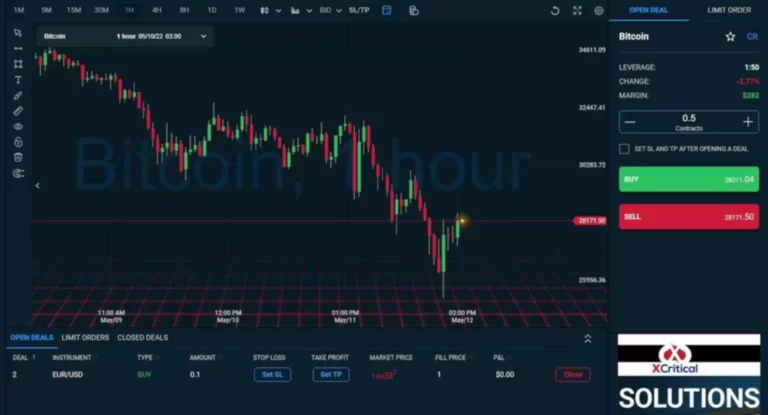Smart Contract 101: Everything you need to know, aplications, and use cases with examples
Content
The concept of “smart contract” was introduced by Nick Szabo in the 1990s, long before blockchain technology came into existence. Szabo envisioned digital protocols designed for secure information transfer, but the lack of suitable technology at the time limited their practical application. The emergence of Bitcoin in 2008 marked a pivotal moment for smart contracts as it enabled decentralized peer-to-peer transactions, laying the groundwork for more advanced applications. One of the significant advantages of a smart contract is its ability to automate specific business processes between parties, thereby enhancing efficiency. Smart contracts significantly reduce human effort and streamline operations https://www.xcritical.com/ by eliminating the need for third-party verification. The reduction in counterparty risk and increased trust make smart contracts a superior alternative to traditional digital agreements.
Beginning Thoughts: A Deep Dive Into 6 Practical Smart Contract Use Cases
Chainlink Verifiable Random Function (VRF) overcomes these issues by providing smart contracts with a secure source of randomness backed by a cryptographic proof that cannot be manipulated by oracle nodes, users, or development teams. A unique use case for smart contracts is non-custodial “smart portfolios” that automatically rebalance user portfolios by executing trades on their behalf based on preset conditions. This provides users with advanced financial products that programmatically manage investments based on the current market-wide price of specific assets and tokens. These trading strategies can be tokenized, allowing users to transfer and use these tokens within other smart contract applications. Blockchain-based money markets are blockchain smart contract crucial financial infrastructure that use smart contracts to connect lenders, who wish to earn yield on their assets, with borrowers, who wish to gain access to working capital.
Understanding the Basics of Smart Contracts
- Perhaps one of the most promising real world smart contract use cases is their potential to function as legally binding contracts — the kind that inform most of today’s business engagements.
- That’s because with a smart contract, the code defines the mechanisms of the transaction and is the final arbiter of the terms.
- The following subsections will provide detailed guidelines for developers to create robust and secure smart contracts.
- As the DeFi ecosystem continues to expand across a number of blockchain networks, the opportunity for generating yield from existing protocols like Aave will fractionalize across disconnected environments.
This ensures the money market protocols are always sufficiently collateralized, protecting tens of billions of USD value in user deposits. Smart contracts ensure that the terms of the agreement cannot be altered without the consensus of all parties involved. This transparency allows all participants to verify the contract’s terms and its automated execution, fostering a trustful environment where parties can confidently Know your customer (KYC) engage without fearing breaches or manipulations.
How can I start developing smart contracts?
In real estate, a smart contract is typically triggered by the buyer’s payment to the vendor, ensuring all terms are met before completing the transaction. These contracts facilitate the transfer of property ownership by automating the handover process. This not only speeds up the transaction but also reduces the risk of errors and disputes, making real estate transactions more efficient and secure. Smart contracts can help insurance companies streamline lengthy claims management by automating claims validation and execution based on predefined conditions. When an insured event occurs, the smart contract can automatically assess the data from an on-chain source or Internet of Things-powered sensor and execute payouts, eliminating the need for mediators.


By offering an unchangeable record of transactions they lessen the chance of fraud or inconsistencies. In addition, smart contracts speed up P2P and cross-border transactions and help with identity verification. Companies can find a wide range of use cases, including financial services, supply chain management, intellectual property, healthcare, digital assets, etc.
As its name suggests, GameFi lies at the intersection of blockchain-based gaming and decentralized finance. By offering economic incentives, developers can create an engaging gaming experience that encourages players to participate in the game’s ecosystem. CCIP enables the secure transfer of arbitrary data, tokens, and instructions between public and private blockchains. As a multi-trillion dollar industry, bringing bonds onto the blockchain can greatly reduce counterparty risk and lower operational costs across the board. Organizations that know how to use smart contracts acquire a competitive edge over their competitors, standing to enjoy benefits such as cost optimization, greater transactional security, enhanced business performance, and increased trust.
This decentralized infrastructure eliminates the need to rely on a centralized authority and prevents contract terms from being tampered with. While smart contracts have proven exceptionally useful in various industries, the BFSI segment receives the most benefits from smart contracts, followed by healthcare and logistics. Smart contracts have enabled the creation of non-fungible tokens (NFTs) by allocating ownership and managing the transferability of NFTs. These contracts can also be modified to include additional features such as royalty payments and access rights to a platform or software. With the advent of blockchain-based public sales, many projects are looking for ways to fairly choose the order of sale participants beyond the common “first come, first serve”’ model, which can be easily manipulated.
Together, these characteristics of blockchain in gaming have the potential to drive mainstream adoption and a more equitable value model. Another example is the Energy Web Foundation, a non-profit organization that uses blockchain technology to create a decentralized energy grid. The platform utilizes smart contracts to automate transactions between energy producers and consumers, facilitating peer-to-peer trading and reducing the need for centralized intermediaries. Before delving into the specific use cases of smart contracts, it’s important to first understand what they are. They are written in code and automatically execute transactions based on predefined conditions that are agreed upon by all parties involved. Whether you want to buy a property or rent it out, smart contract-based agreements can offer you a safe and reliable way to do so.
Automation of issuance, distribution, and tracking ensures compliance, lowers administrative burdens, and boosts investor confidence. In summary, smart contracts offer numerous benefits, including enhanced efficiency, security, and cost savings. Their ability to execute automatically without intermediaries makes them a powerful tool for modern business transactions.
Once deployed on a blockchain, the outcomes of smart contracts cannot be altered, which enhances their security and reliability. This immutability ensures that the contract’s terms are upheld without any risk of tampering or modification. Additionally, a smart contract can interact with real-world data through oracles, enabling them to respond to external events and conditions. In a real-world use case, smart contracts can manage a decentralized data repository for medical research.
This can lead to increased efficiency, improved trust between trading partners, and a more accessible global trade ecosystem. Smart contracts offer a solution by enabling artists, writers, and creators to protect their work through transparent and immutable records. In addition to empowering creators, smart contracts also help in enhancing the accountability and foster a fairer distribution of profits by eliminating intermediaries, such as copyright agencies and legal professionals. To ensure the integrity and proper functioning of smart contract applications, developers may want to verify whether or not a protocol has undergone one or multiple security audits before sending it funds. Using an oracle, users can get on-demand verification of audit results directly on-chain, opening up use cases like automatic checks before certain transactions, such as high-value ones, or when acting as a trusted custodian for other users funds. The emissions and waste disposal industries can be transformed by IoT-enabled smart contracts that can accurately measure output and efficiency.
Through Chainlink Proof of Reserve, smart contacts are able to autonomously audit the collateralization of real-world asset-backed tokens, protecting users during black swan events. Financial products provide different vehicles in which people can maximize the value of their money via different strategies like hedging, speculating, earning interest, collateralizing loans, and more. However, traditional finance is often gated, wherein well-capitalized entities have disproportionate control over the issuance of money and the creation/offering and settlement of financial products. Smart contracts boost performance by automating contractual obligations, which can significantly expedite transaction processing compared to traditional methods. This automation not only accelerates operations but also mitigates potential human errors, ensuring accurate, efficient, and timely execution of terms.
Finance, gaming, legal, real estate, supply chain, healthcare, and governance are all covered in these innovative use cases. Sometimes, traditional contracts can be interpreted in several ways, leading to resource-intensive dispute resolutions and management. In combination with IoT data analytics, smart contracts can help the construction industry streamline productivity and speed up payment processing. For example, by using computer vision-enabled cameras, the system can detect when a supplier delivers materials and automatically transfer funds to that supplier. A smart contract is a programmable electronic protocol stored on a distributed ledger that automatically enforces itself when certain conditions embedded in its code are met. Smart contract development is commonly used in finance, real estate, and supply chain sectors.
Smart contracts leverage this technology to facilitate, verify, or enforce the negotiation or performance of a contract, thereby offering a level of efficiency, security, and trust previously unattainable in digital transactions. Bringing legal and commercial processes onto blockchains promises extraordinary efficiency gains thanks to accuracy, transparency, and reliability. But thoughtfully navigating the pitfalls as smart contracts permeate real world operations will determine whether transformational potential is achieved responsibly. Though adoption is still early, automation and transparency from smart contracts offer appealing benefits for insurers.
While society may not agree on various issues, an initiative most people can get behind is creating more transparency, accountability, and efficiency in government institutions. The healthcare industry stands to gain enormously from incorporating blockchain smart contracts and deploying them in various capacities. For example, smart contracts can streamline patient data management by enabling secure and prompt access for authorized healthcare providers. They can also automate the complex medical billing process, reducing errors and preventing fraud. This list of real world applications of smart contracts is by no means exhaustive, and smart contract technology stands to improve upon countless other industries far into the future. Many researchers and developers are eager to leverage the benefits of smart contract technology to address needs of the growing Internet of Things (IoT).
